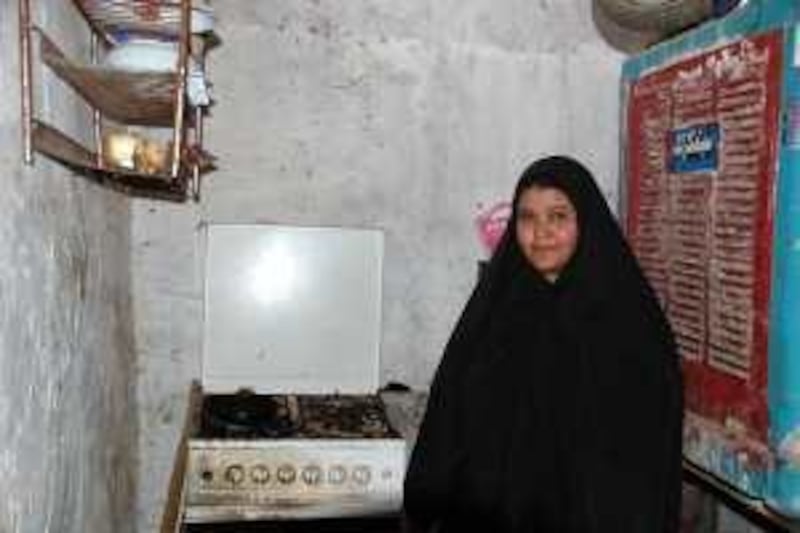BAGHDAD // With her family mired in deepening poverty, Sajida Mohammad was happy enough that her father accepted the proposal of marriage when it came. The man who would become her husband was a stranger to them all, but he promised financial help and there seemed to be no other options.
It was, however, a decision the 28-year-old Iraqi woman came to bitterly regret because, within a month, her hopes had collapsed and the newlywed found herself being sold as a prostitute by her spouse. "For a short time he was nice to me, and did give my family some money and that was good," she said. "Then we moved house, to a small apartment and one day he invited some friends over and told me I must do anything they wanted, even if it was something that should only be between a man and his wife.
"I rejected the idea, but my husband was drunk and he beat me." According to Ms Mohammad, the attack was so severe that she lost consciousness. After recovering, she said, her husband laid down the law: she would work for him and have sex with whomever he brought back to their flat in Karrada, in central Baghdad. If she complained, he would stop giving money to her parents or even kill her. "I didn't have any choice and so I did what he told me," Ms Mohammad explained. "I lived that kind of life for a year. I slept with any man he brought to me. I didn't see any way to escape from it, and I couldn't tell anyone what was happening."
In Iraq, as in other Middle Eastern countries, it is not uncommon for the victims of sexual crimes to be heavily stigmatised by what has happened to them. Women who are raped are often deemed to have sullied their family's reputation and can be disowned or even murdered by their own relatives in so-called honour killings. For that reason, Ms Mohammad suffered in silence, refusing to say anything to her parents or sisters. The ordeal only came to an end by chance when, little more than 12 months after she was married, the police came to search her home. They had arrested and imprisoned her husband on terrorism charges.
As a result of the police investigation, Ms Mohammad discovered the man she had married had been part of a gang involved in prostitution. He had a number of wives and a number of identities. She had never even known his real name. While the authorities dealt with her case, she met someone from the Baghdad Women Organisation (BWO), a group of activists who campaign for women's rights and provide practical care for those in need, including women who have been sold into prostitution. Volunteers helped her get a divorce and safely reunited her with her family, which welcomed her back into their fold.
Ms Mohammad described herself as "recovering", explaining that she still bore the scars from her ordeal. "This kind of thing did not just happen to me, it has happened to many others, and there is no one to protect women from being put through this kind of hell," she said. If it had not been that her husband was involved in other criminal activity, she said, she had no doubt that she would still be trapped with him.
Although no official figures are available for such incidents, Lisa Nisan, head of BWO, said the trade in women forced into prostitution had "flourished" since the US-led invasion of 2003 and was getting worse. According to her estimate, at least 200 Iraqi women were sold into sex slavery annually, a number she believed was rising. "We have been involved in more than 200 cases of abuse and prostitution" since the fall of Saddam, she said in an interview. "Iraqi women and children are cheap and end up being sold to brothels in the Gulf and even Europe.
"There are well-structured organisations behind this and there are some government officials who facilitate their work by providing paperwork, especially for those women who are transferred outside of the country." Ms Nisan criticised the Iraqi authorities for not doing more to stop the trade or deal with its consequences. "We have warned the government about this," she said. "Yet still we rely on donations from Iraqi businessmen, some humanitarian organisations and even Iraqi MPs who give us money from their own pocket. We get no funding from the government."
On the ground there is little sign of this type of trafficking stopping or even slowing down. Umm Habib works as a matchmaker in east Baghdad's Zafraniyah neighbourhood, a semi-traditional role by which men wishing to marry can be found a suitable wife. The would-be husbands hand over a fee and specifications and, using their knowledge of the local women, the matchmaker tries to find a suitable candidate and make the necessary introductions.
"The truth is that some of the men who come to me are surely working as traffickers," Umm Habib said. "But it's not something that I can find out beforehand, I only hear about it afterwards. The woman might disappear and I only know about it when the family comes to me and asks where their daughter or sister has gone." The 58-year-old, who sees herself as an important social catalyst in modern-day Iraq, said some of her clients had been government officials who come to look for "beautiful, young poor girls" and whom she suspected might have been involved in trafficking.
"Most of my customers are legitimate," she said. "But it is hard to tell and I think I've had some government officials who have come for girls and who have sold them into prostitution. "Conditions are hard now in Iraq and society today is making my work more in demand, not less." nlatif@thenational.ae





